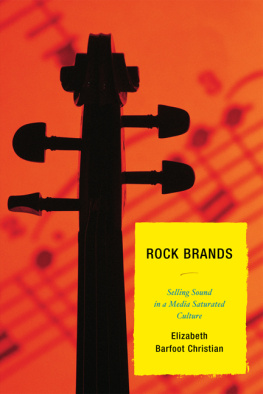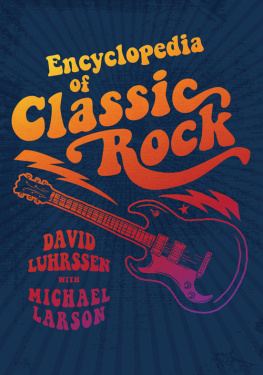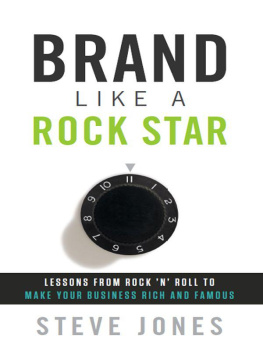Rock Brands
Rock Brands
Selling Sound in a
Media Saturated Culture
Edited by Elizabeth Barfoot Christian

Lexington Books
A division of
ROWMAN & LITTLEFIELD PUBLISHERS, INC.
Lanham Boulder New York Toronto Plymouth, UK
Published by Lexington Books
A division of Rowman & Littlefield Publishers, Inc.
A wholly owned subsidiary of The Rowman & Littlefield Publishing Group, Inc.
4501 Forbes Boulevard, Suite 200, Lanham, Maryland 20706
www.lexingtonbooks.com
Estover Road, Plymouth PL6 7PY, United Kingdom
Copyright 2011 by Lexington Books
All rights reserved. No part of this book may be reproduced in any form or by any
electronic or mechanical means, including information storage and retrieval systems,
without written permission from the publisher, except by a reviewer who may quote
passages in a review.
British Library Cataloguing in Publication Information Available
Library of Congress Cataloging-in-Publication Data
Rock brands : selling sound in a media saturated culture / edited by Elizabeth Barfoot
Christian.
p. cm.
Includes bibliographical references and index.
ISBN 978-0-7391-4634-7 (cloth : alk. paper) ISBN 978-0-7391-4635-4 (pbk. : alk.
paper) ISBN 978-0-7391-4636-1 (electronic)
1. Rock musicMarketing. 2. Branding (Marketing)Social aspects. I. Christian,
Elizabeth Barfoot, 1971
ML3534.R62 2010
781.66068'8dc22 2010039845
 The paper used in this publication meets the minimum requirements of American
The paper used in this publication meets the minimum requirements of American
National Standard for Information SciencesPermanence of Paper for Printed Library
Materials, ANSI/NISO Z39.48-1992.
Printed in the United States of America
A Note on the Epigraphs
T he quotations appearing on the pages separating the three parts of the book did not originate in published articles or interviews, and there is not a readily available context that would affect the interpretation of the quotations. All the same, below is some reference information that was most recently accessed July 21, 2010:
Part I : Ozzy Osbourne quotation appears on ultimate-guitar.com; Paul Stanley quotation can be found on musicbizacademy.com and rockstarmindset
.com.
Part II : Marilyn Manson quotation can be accessed at allgreatquotes.com, quotationspage.com or bebo.com; Adam Jones quote was retrieved from brainyquote.com and appears on quotehash.com and iqpedia.com.
Part III : Elvis Presley quotation can be found at brainyquote.com, quotationspage.com, and thinkexist.com; Christopher Knab quotation appears at barryrudolph.com and audioaddictiononline.com.
Introduction
R ock Brands: Selling Sound in a Media Saturated Culture will explore how different genres of popular music are branded and marketed today. The books core objective is to understand how established mainstream artists/bands are continuing to market themselves in an ever-changing technological world.
The chapters in this book will look at several key artists/bands and how they have addressed challenges brought on by changes in the industry and technology-driven media overload. What makes them stand out and succeed when so many fail? How do you find a niche that isnt just kitsch and can stand the test of time, allowing the musician to grow as an artist as well as grow a substantial fan base?
When one thinks of KISS, Bon Jovi, Elvis, or Ozzy Osbourne, a specific sound or image is produced, but few ever consider why or how that happens. Most of us, too, think either positively or negatively about these bands and often associate a specific happening in our lives with one or more of their songs. Subsequently, fans come to feel a personal connection to bands that personify ideals similar to their own or that allow them to fully express who they are. Therefore, it is imperative to the success of a band to know who they are and who their audiences are.
The record industry is dead, KISSs Gene Simmons declared at a press conference in 2008. Its six feet underground. No, KISS would not be recording new material until the problem of illegal downloading of music for free was fixed, he declared. So in one years time, what changed the mind of one of the most formidable rock groups of all time? Well, nothing... and everything.
Illegal downloading hasnt stopped, though prosecution of offenders is occurring and sites are being shut down. That doesnt stop others from popping up, as the law struggles to keep up with technology. However, the digital technology that has created this problem has also created new and exciting means of communicating to fans and that means money. Something Simmons gets very excited about.
The first decade of the twenty-first century did see a significant shift in not only how people purchase music but also how bands and wannabe rock stars communicate with fans and potential consumers for their products. Digital downloading of music, of course, is the most significant change the music industry may have ever experienced, but it hasnt killed the recording industry as Simmons suggested. But it has shaken it to its foundations, and successful bands can no longer rely on simply recording catchy tunes to stay relevant in todays pop culture.
Classic rocks audience is aging but still a significant source of traditional album sales. And older groups, while not dependent on new music to stay profitable, must remain relevant to younger, more technologically savvy listeners. Young people have grown up in a world that has always been downloadable. True, classic tunes will be new to them but delivery must be easy for kids. They wont expend a lot of time and energy looking for itits got to be easily accessible. Todays listeners arent just buying songs, they are buying experiences, memories, and emotions. How else can one explain shelling out $2.49 for a 4-bar measure of a song for a ringtone? Or paying fifty dollars for a band T-shirt at a concert? Logically, these dont make rational sense. We dont need these things. But we buy them without question for those rock band brands with whom we feel a kinship.
Brand loyalty does not happen overnight. It takes several repeated interactions with the band and its message, and that holds true even in todays fast-paced Internet culture. Far more musical groups fall by the wayside every day due to a lack of a clear, focused identity than due to lack of talent. You not only have to reach your target audience, you have to know what you are reaching them forwho are you and why should they listen? To form lasting bonds with consumers, there must be something for fans to get passionate about.
The growing marketplace, not just the Internet, but all facets of media have grown exponentially during the last quarter century. And all these avenues create places to showcase sound. Cable and satellite television channels now number in thousands. Movie soundtracks often produce number one hit tunes today, and bands are sometimes specifically sought after by directors to write songs directly for a movie tie-in. The video game industry, perhaps, is one of the newest outlets for popular music. Commercial opportunities for both classic and current songs abound as more games are created solely for music fans, including the Rock Band and Guitar Hero series of games. Rock Brands includes chapters that delve into these changing outlets for popular music: gaming, reality television, and social networking sites.
Rock Brands is divided into three sections. In the first section of the book, specific rock bands will be showcased for their creative contributions to the successful marketing of music. Chapters will focus on the commodification of popular music through technologies, licensing and exclusive deals with mega-retailers, like Walmart.










 The paper used in this publication meets the minimum requirements of American
The paper used in this publication meets the minimum requirements of American